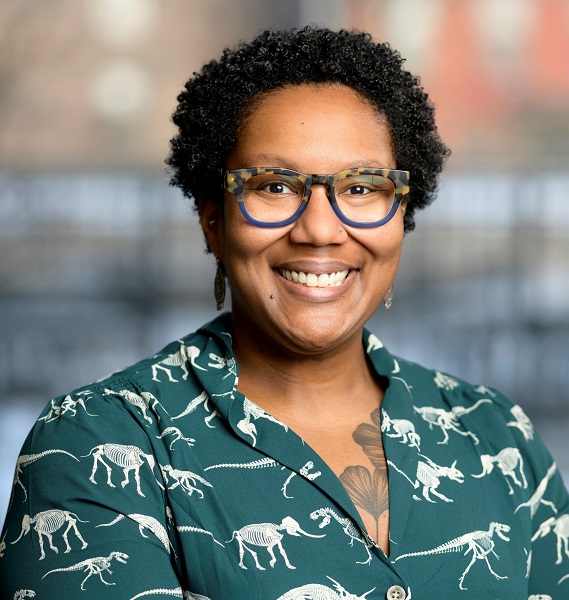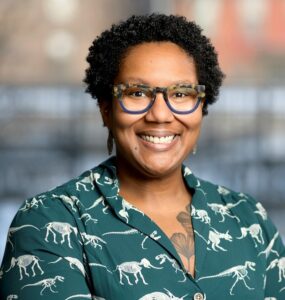Like many nurses, Heather Hightower, MSEd, RN, CPHON, didn’t plan to become a nurse. But they’ve found a career in pediatric hematology/oncology nursing that fulfills their passions for science and for working with an adolescent and young adult population. For today’s celebration of Pediatric Hematology/Oncology Nurses Day, Hightower shared some thoughts on this career path.
Hightower is now the office practice nurse for the Adolescent and Young Adult Program at Memorial Sloan Kettering Cancer Center, and their nursing path started with an undergrad degree in religious studies, a master’s degree in education, and some time as a high school science teacher in New York. Hightower says they realized nursing was a field they were interested in pursuing.
“I love education and teaching students,” they say, and their current role helps a younger population navigate a cancer diagnosis while grappling with essential life questions of “Who am I?” and “What can I be in this world?” The work is Hightower’s sweet spot. “That population needs additional support because they are navigating so many things at the same time, and then they have a cancer diagnosis and everything gets derailed,” they say. As a nurse and an educator, Hightower pulls on all of their experiences and skills each day. “It’s so human and so science-y at the same time,” they say.
From Job Fair to New Specialty
Thinking they’d like to be a midwife or a labor and delivery nurse and playing with the idea of returning to New York, Hightower says a conversation at a job fair unexpectedly led them to Memorial Sloan Kettering Cancer Center. The hospital didn’t have a labor and delivery department, but they did have a women’s health department, and Hightower eventually began working there with gynecology oncology and breast oncology patients as an inpatient bedside nurse. “But I missed working with a kids,” they say.
A mentorship program led them to pediatric oncology and eventually to their current role where they work with adolescents and young adults aged 15 to 39. The Adolescent and Young Adult Program at Memorial Sloan Kettering supports patients from all angles, and Hightower makes personal connections with their patients and with all the other departments they might need. “We consider what are the supports they need,” they say. “They need counseling, social work, vocational and school support, but also nursing that supports health literacy development and supports social development.”
Helping Patients Through the Cancer Journey
For Hightower, the unease and struggle to find a place in a new situation hits home. “I remember what it’s like to be a new kid and try to make new friends,” they say. “So I see them come in and feel this is so foreign to them and they just want to find someone they can connect with so they aren’t doing this alone,” they say. “It’s the same idea, just a different location.”
Within a specialty that is focused on cancer patients but encompasses a wide age range and all different cancers and treatment modalities, Hightower has found nursing support as a member of the Association of Pediatric Hematology/Oncology Nurses (APHON), the professional organization for pediatric hematology/oncology nurses and other pediatric hematology/oncology healthcare professionals. “I can say so many wonderful things [about pediatric hematology/oncology nursing], but at the end of the say it’s really tough,” says Hightower. While nurses celebrate the many successful treatments and healthy patients, they go through real lows as well. “APHON is there to support nurses,” they say and bring together nurses who are driven to advance treatment and quality of life for their patients.
With so many moving pieces to treatment, Hightower says having excellent communication and critical thinking skills is essential. They need to be able to talk with their patients (often either very chatty or very quiet) and help them understand, but also communicate with families and other medical teams. “It’s often saying the same idea in different ways, and it’s a real skill set,” they say because it all has the same goal of supporting the patient and understanding how each step will ensure the best possible care. Hightower must be agile to synthesize all the medical information into words a parent, caregiver, or patient can understand while also working with researchers, labs, and other nurses.
Representation Is Key for Patient Relationships
Hightower is also mindful of how diversity and representation holds a big place in caring for any population, but especially an adolescent and young adult one. “I feel like diversity is my second job,” they say. Hightower says their identities as Black, queer, and nonbinary help inform everything they do with patients.
“It’s important, particularly for patients of color and patients who identify as part of the LGBTQ+ communities, to find someone who can understand them and who can respect them,” Hightower says. “It’s hard to show up as your authentic self, so it’s important for me to show up as a queer person of color and say, ‘I am here and you can be here too. You can be here comfortably and safely. I am here to support you however you show up.'”
Professional Organization Offers Support and Education
Hightower says APHON is an excellent resource for pediatric hematology/oncology nurses. APHON members are dedicated to promoting optimal nursing care for children, adolescents, and young adults with cancer and blood disorders, and their families.
Recent advances in cancer treatment are exciting, says Hightower, particularly in CAR T-cells and in immunotherapy. Members share information and strategies to see what else they can do to integrate into their own practices. Conferences are an excellent opportunity. “It’s bringing minds together around this really important population,” they say, “and figuring out how do we support that nationally.”
- Why Finding a Nursing Community Is Important - May 10, 2024
- A Camp Nurse Volunteer Shares the Joy - April 30, 2024
- Is the FNP Program Right for You? - April 24, 2024




